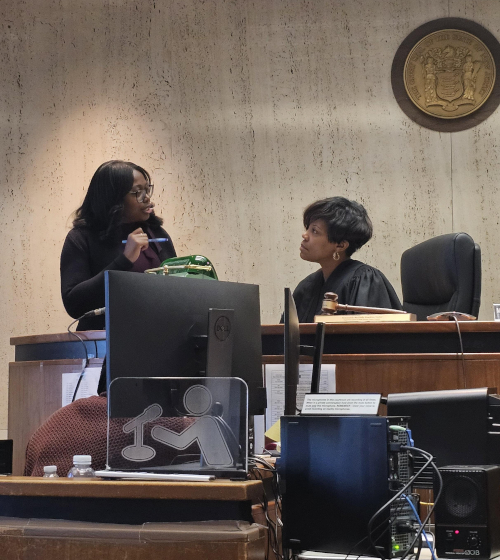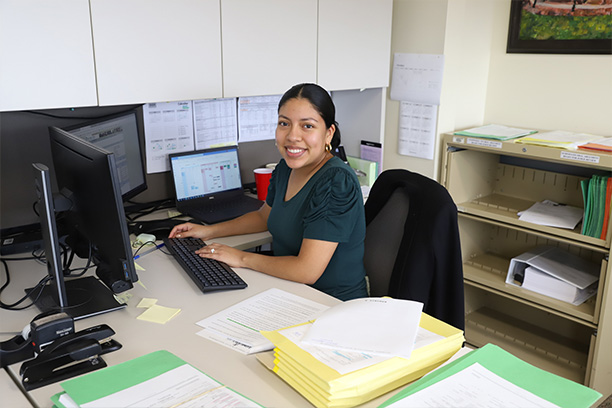Apply to become a law clerk in the New Jersey Courts for challenging work, skill-building, new connections, and impactful public service with various benefits including paid leave and student loan forgiveness.

A clerkship means busy days, challenging work, and new connections that can drive your career forward.
Why clerk for the New Jersey Courts?
- Build skills & relationships
- Collaborate on real cases
- Experience legal leadership
- No residency requirement
- Paid time off
- Pension and benefits
- Student loan forgiveness
- Impactful public service
Apply Online
Submit Your Application
Find a Judge
Locate Judicial Profiles
Recommendations
Upload Letters
Application Season Starts in June!
Students generally apply at the end of their 2L year for clerkships that start the August after graduation. New lawyers with four years of experience or less also are encouraged to apply. Read the self-registration guide.
2026-2027 Court Term Dates:
- 53 weeks (Supreme and Appellate): August 24, 2026 to August 27, 2027
- 54 weeks (Trial Court): August 17, 2026 to August 27,2027
Supreme Court Clerkships
The New Jersey Supreme Court is the state’s highest appellate court. Arguments are heard at the R.J. Hughes Justice Complex in Trenton, but the justices and their clerks work in chambers around the state. The court has issued ground-breaking case law in many areas, including individual rights, education, housing, product liability, family law, and criminal procedure.
- Positions: 21
- Tasks: Perform legal research; write memoranda; help draft court opinions.
- Skills Required: Legal research and writing.

Appellate Division Clerkships
The Appellate Division of Superior Court is an intermediate appellate court. Appellate chambers are located throughout the state, and arguments are heard by panels of two or three judges in courtrooms in Trenton, Morristown, Newark, and Atlantic City. Each of the 32 appellate judges has two law clerks. Applicants who have or will have clerked in the trial court are eligible to be considered for a successive appellate clerkship.
- Positions: 64
- Tasks: Perform legal research; write memoranda; edit published and unpublished opinion drafts; triage emergent matters at times; prepare summer research memos.
- Skills Required: Legal research, legal writing, familiarity with Blue Book style.
“I believe my clerkship significantly helped me develop skills that will benefit me as a first-year practicing attorney. I had a wonderful experience, learned a tremendous amount, and feel more confident going into my next position. My familiarity with the judiciary and more specifically, the Appellate Division, has been very useful. I've made connections with people I intend to keep moving forward in my career.”
Assignment Judge Clerkships
Assignment judges oversee the Superior Court in each vicinage. Assignment judges are required to hear certain types of cases for their vicinage. They also will hear other cases, depending on the needs of the vicinage and their own professional background. Researching the AJ’s previous assignments can be a helpful indicator of what types of tasks their law clerk will support.
- Positions: 30
- Tasks: Legal research and writing; help draft opinions and orders; moderate remote proceedings; communicate frequently with attorneys, self-represented litigants, and court staff; manage adjournments requests, with the judge’s input; handle emergent applications.
- Skills Required: Legal research, organization, communication.
“I really think this clerkship opened doors for my career that would not else be available. Great firms reached out specifically to the clerks to interview them.”
Family Division Clerkships
The family division handles some of the most complex cases in Superior Court. Judges resolve disputes involving children, youth, spouses, and domestic partners. As such, family division law clerks can gain experience on a wide range of legal issues and casework. Cases include adoption, abuse and neglect, child placement review, dissolution, non-dissolution, kinship and legal guardianship, juvenile delinquency, domestic violence, and Sexual Assault Survivor Protection Act.There are no jury trials in the Family Division. Many cases involve self-represented litigants who need frequent contact with law clerks. Clerks work directly with judges, lawyers, and litigants. Their efforts will have a direct impact on the lives of families in New Jersey.
- Positions: 120
- Tasks: Legal research and writing; help draft opinions and orders; moderate remote proceedings; communicate frequently with attorneys, self-represented litigants, and court staff; manage adjournments requests, with the judge’s input; handle emergent applications.
- Skills Required: Legal research, legal writing, mediation training or coursework.
“I found the position very helpful in preparing for the legal world. The clerkship provided me with the experience of what it would be like practicing in the legal field, an experience that law school does not provide.”
Criminal Division Clerkships
The Criminal Division trial judges are responsible for managing cases in which a person has been charged with committing one or more criminal offenses, for example, murder, assault, robbery, or drug distribution. Certain judges also preside over Recovery Court Program cases, which serves offenders who are likely to benefit from treatment and do not pose a risk to public safety. Some judges have additional tasks assigned, such as expungements, applications for post-conviction relief, Megan’s Law cases, gun permit appeals, and wiretap applications. Most judges also conduct pre-trial detention and release revocation hearings.
- Positions: 120
- Tasks: Conduct legal research; assist with drafting jury instructions and legal opinions; draft court orders as well as sentencing and other memoranda; manage motion calendar; perform case management functions; assist and occasionally conduct remote proceedings; communicate with attorneys and court staff.
- Skills Required: Legal research and writing; organization; communication.
“Clerking in the trial level, the majority of which was in criminal, gave me invaluable insight into the practice of law that I was not exposed to in law school or in any internships that I have had.”
Civil Division Clerkships
The civil division, which includes both the civil part and the special civil part, resolves disputes involving monetary compensation for a harm that the defendant has cause the plaintiff. Civil cases encompass a wide array of subject matters and range in complexity from two-party cases to class action and multi-county adjudication impacting many individuals. Examples of civil cases include auto accidents, medical and legal malpractice claims, product liability and toxic torts, civil rights actions, employment and other discrimination suits, civil commitments, election law cases, environmental litigation, land use, zoning and planning, and landlord-tenant disputes.
- Positions: 110
- Tasks: Prepare bench memoranda for civil motions and for motional in limine; Review pre-trial memoranda and prepare voir dire and points for charge for civil trials; perform legal research; draft court orders; prepare legal correspondence; manage motion calendar; assist with drafting legal opinions; assist with case management functions; communicate with attorneys, self-represented litigants, court staff; bar associations and legal services, and the public.
- Skills Required: Legal research and writing, organization, communication.
“The clerkship is a fantastic experience. The clerkship is the perfect time to meet judges and attorneys. It's the time to build a relationship and learn how each judge likes to run their courtroom. It's also the time to ask any question about the process or any law that you may have. I think that some people who don't know must about clerkships aren't aware of the relationships and mentor you get with your judge and the rest of court staff who you would be seeing regularly if you choose to practice in that area. I would recommend a clerkship to anyone.”
General Equity (Chancery) Clerkships
General equity and probate part resolves cases that primarily involving non-monetary relief, such as protection of trade secrets, enforcing non-compete agreements, foreclosure, and appointing guardians for incapacitated individuals, and probate.
- Positions: 20
- Tasks: Conduct legal research; review case documents to prepare bench memoranda; draft orders; proofread judges’ orders and opinions; interact with attorneys and self-represented litigants; attend court events and settlement conferences; assist with emergent temporary restraining order applications.
- Skills Required: Legal research and writing; organization; communication.
“I enjoyed the Chancery Division, General Equity cases. The work was very substantive. I also think it was a pleasure working with the entire court staff, who were all really helpful.”
Tax Court Clerkships
The court hears appeals on local property taxes and Division of Taxation decisions on gross income, sales and business taxes, and homestead rebates. This small court focused exclusively on these issues and have contributed to the development of a consistent, uniform body of law for taxpayers and tax administrators to follow. It has also helped promote the development of a qualified and informed state and local tax bar. Chambers are located in Newark and Trenton. Some Tax Court judges are also assigned to certain Superior Courts and their chambers are the county courthouse.
- Positions: 12
- Tasks: Review and process motions; perform legal research; draft case management orders and other legal documents; manage motion calendar; help moderate remote court proceedings; communicate directly with attorneys, litigants, court users, and staff.
- Skills Required: Legal research, organization, communication.
“My experience with the Tax Court has been excellent. The judges that are a part of the judiciary are of the highest quality that I have experienced so far, and the integrity of the judges has provided me with an example of the type of court I would like to practice in.”